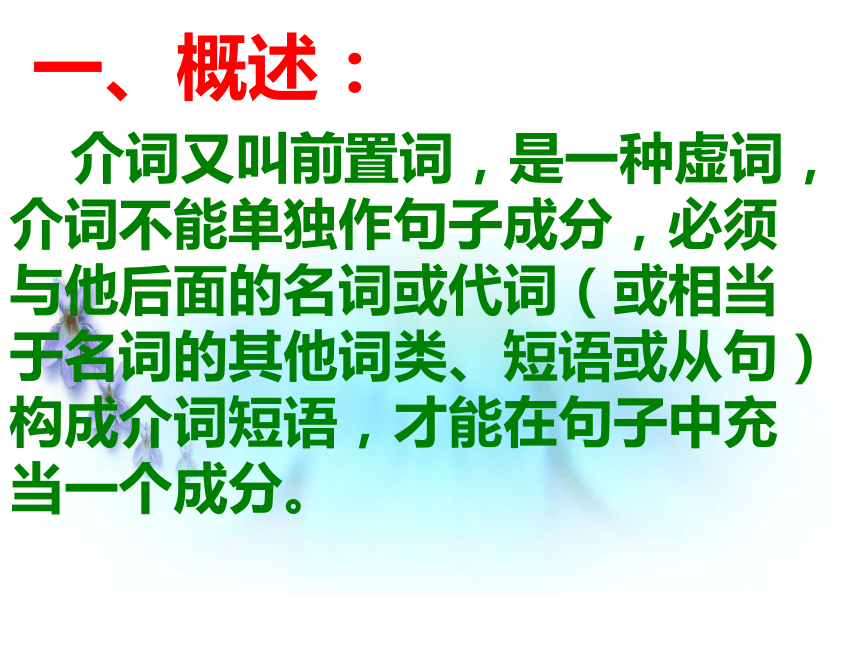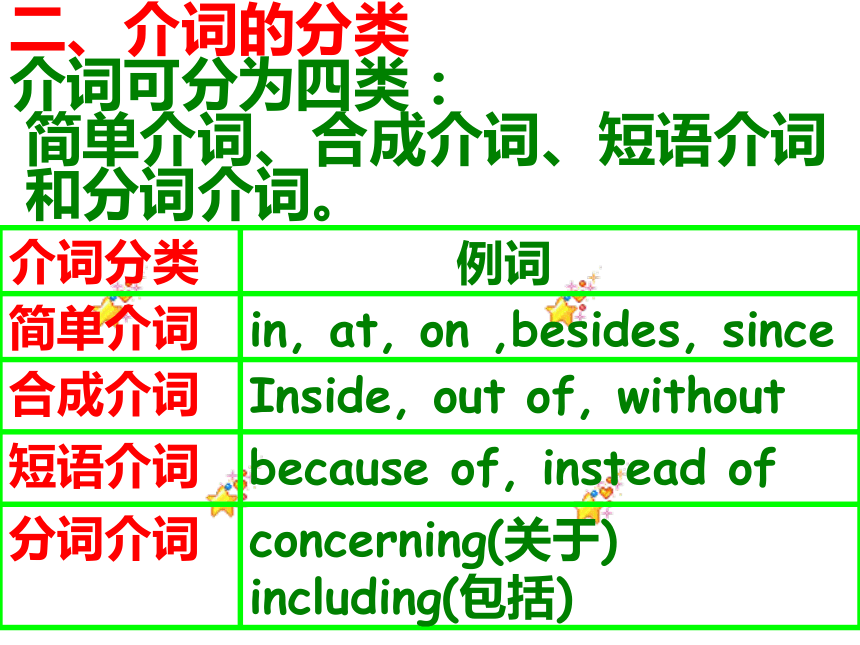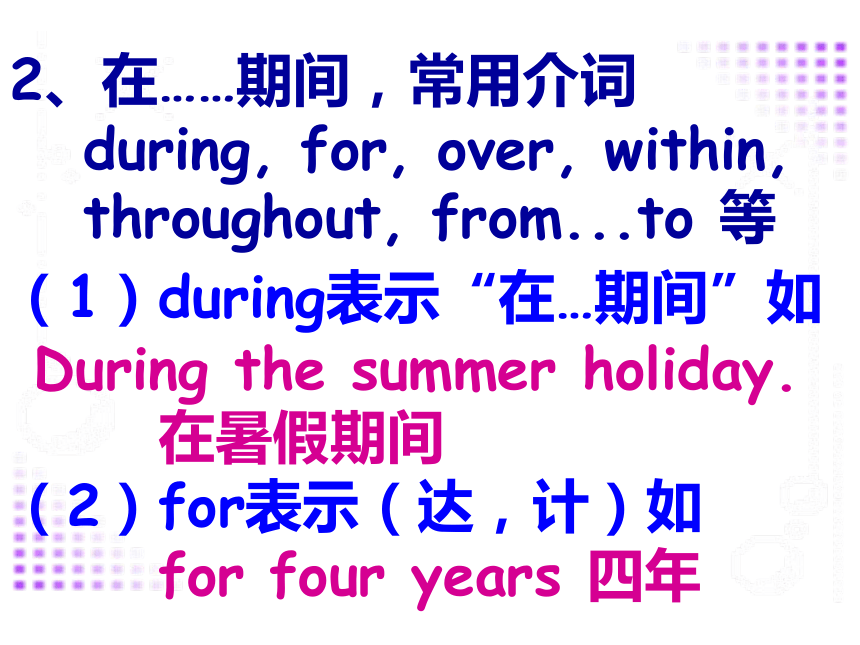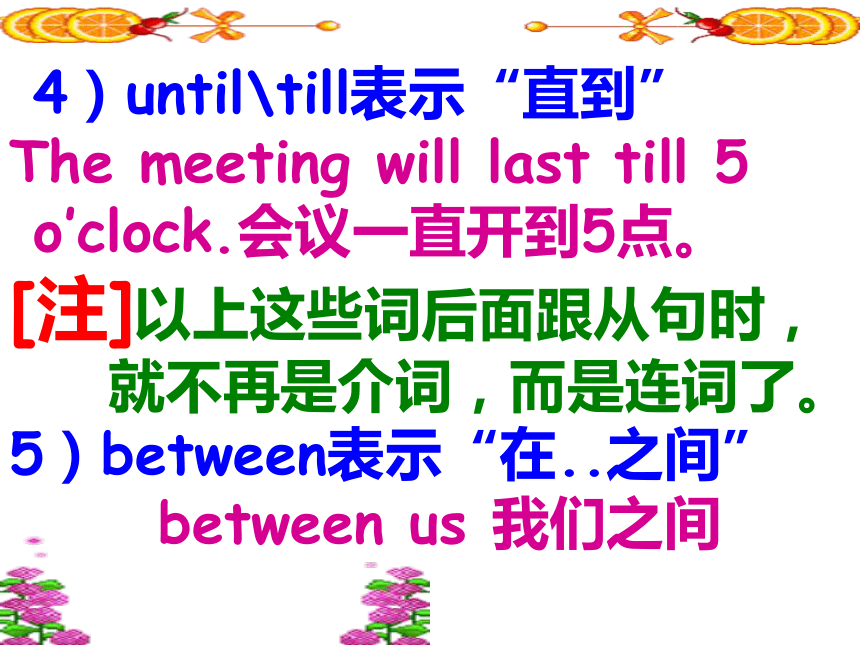高考二轮专题复习介词
图片预览












文档简介
课件69张PPT。高考二轮复习
语法系统讲解
介词
主讲人 吴世民本课我们从以下三方面剖析介词 1.介词的概念 2.介词的分类 3.介词的常用用法 介词又叫前置词,是一种虚词,
介词不能单独作句子成分,必须
与他后面的名词或代词(或相当
于名词的其他词类、短语或从句)
构成介词短语,才能在句子中充
当一个成分。一、概述:二、介词的分类
介词可分为四类:
简单介词、合成介词、短语介词
和分词介词。 三 介词的常用用法
(一)表示“时间”的介词
1、表示“在何时”常用介词at,
on, in等
(1)at 一般用来表示在某一具
体的时间点,如:
at ten o’clock 在10点钟
at the weekend 在周末
at night 在晚上
at noon 在中午(2)on用来表示“某天或某天上、
下午”,如:
on Monday 在星期一
on January 在1月1日
on the following day第二天
on a cool winter evening
一个寒冷冬天的晚上 (3)in用来表示“一段时间”,还可
用在月、季节、年等时间短语前,
如:
in August 在8月
in 1984 在1984年
in the day 在白天
in a minute 一会儿2、在……期间,常用介词
during, for, over, within,
throughout, from...to 等
(1)during表示“在…期间”如
During the summer holiday.
在暑假期间
(2)for表示(达,计)如
for four years 四年3)within表示(在…期间,不超
过)如:
I’ll be back within an hour.
我一小时以内就赶回来
4)from…to…表示(从…到…)如:
from 6 to 8 从6点到8点3、表示其它时间概念的介词有
beforeaftersinceuntiltill
betweenbyup to等
1)before表示“在…之前,
早于…”如:
before supper 晚饭前
before class 上课前
before long 不久 2)after表示“在…之后”如:
after school 放学后
after a while 过了一会儿
after breakfast 早餐后
3)since 表示自从…
He has lived in New York
since 1985.
他1985年以来一直住在纽约。 4)untiltill表示“直到”
The meeting will last till 5
o’clock.会议一直开到5点。
[注]以上这些词后面跟从句时,
就不再是介词,而是连词了。
5)between表示“在..之间”
between us 我们之间6)by表示“到…为止”,如:
By the end 到那时为止
By the end of last term.
到上学期期末为止
4、在时间状语中,有两种情况不
用介词
1)表示“去年”“上个月”“上周”“今
年”“这个月”“本周”“明年”“下个月”
“每年”“每月”“每周”等概念时。last year (month, week);
this year (month, week);
next year (month, week)
My family are going to Hangzhou next month.
下个月我们一家准备去杭州。
Every summer she goes to
visit her parents.
每年夏天都去看他的父母。2)用all来表示整个“年、月、星
期、天”等概念时,如:
We worked there all afternoon.
我们一下午都在那干活。
She has lived in the village
all her life.
他一辈子都住在那个村子里。表示地点的介词有:
at/in/above/across/after/
against/among/before/behind
等
1、大地点用in,小地点at
in Beijing 在北京
in a city 在城市
at the gate 在大门口(二)表示“地点”的介词2、英语中表示“在..上面/下面”
的介词有on, over, under,
above, below
(1)on,over与above意为“在…之上”
1)on多用于与物体有接触时,
位于物体的表面,边上,线上,
如:
on the table 在桌子上
on the wall 在墙上
on the train 在火车上2above侧重于指上下位置,有对比与参照物,如:
The picture is above the map.
画在地图上方。
3)over侧重于指横跨两端,或有
覆盖的含义,如:
Hang the picture over the
bookshelf.
把这张画挂在书架上面。
There is a bridge over the river.
在河的上面横跨一座桥。(2)under与 below意为“在…之
下”,如:
1)under与 below均可表“正
下方”,如:
The water reached a few
inches below/under the knees.
水离膝盖只有几英寸了. 2)表示“低于..”仅用below,此时
与above为反义,如:
Below the sea level.海拔以下。
3)只用under的情况,如:
play under the tree 在树下玩
pass under the bridge在桥下
流过3、表示“在…前面/后面”用behind
before/in front of/ in the
front of/behind/at the back of
1)表示“在…前面”,可用before
in front of/ in the front of,如
1) in front of通常指位置“在…
的前面/正面”,其反义词为behind,
如:The children are playing in front of their house.
那些孩子正在家门口玩。
2)before在表示空间位置时,与in front of的含义基本相同,但before通常表示“在…面前/眼前”,多与抽象概念连用,暗示在低位或威望相对比较高者之前,或用来表示顺序在前。
常与before连用的词有:
come/go/lie/stand/appear/speak/be/stop/,have等
3)in front of/ in the front of的基本含义一样,都表示“在…之前”,但所指有区别,in front of这一物体在另一物体的前方,而in the front of指一物体包含在另一物的内部的前方。如:
There is a desk in the front
of the classroom.
教室的前面有一张桌子。(桌子在教室内)
There is a big tree in front of the classroom.
教室的前面有一棵大树。
(大树显然在教室外)(2)表示“在…后面”,用after/behind/at the back of
1)behind对应的词应为in
front of,表示“在…后
面”,如:
He parked the car behindthe house.
车停在屋子后面。 2)after对应的为before,如
I was frightened when the dog ran after me.狗在我后面
追我的时候我吓得受不了。
3)at the back of与behind的
意义基本一样,都表示“在…后面”,但所指有区别, behind指一物体
在另一物体的后方,而at the
back of指一物体包含在另一物
的内部的后方,如:
There is a blackboard at the back of the classroom.
教室的后面有一块黑板。
there is a room behind the room.房间的后面有一个房间。
4、表示“在…中间”用between/
among/in the middle of
1)between表示“在…之间”
(常指二者之间)
You can sit between him
and me .你可以坐在我和他之间。
2)among表示“在…中间”(三者
或三者以上)
The animals usually hide among the trees during the daytime.
野兽白天通常藏在树林里。
3)in the middle of指位置时,总是强调在一处地方的中心或中心附近的位置,如:
There is a desk in the
middle of the classroom.
5、表示“在…旁边”用near/by/
beside
(1)near表示“在…附近、靠近”,
暗示距离很近,如:
The smith live near a park.
史密斯一家住在一座公园附近
(2)beside表示“在…附近、靠近”
与by意思相近,如:
She sat in the chair beside the door.
他坐在门边上的一张椅子上。
(3)by表示“在…附近,紧挨”
Mike is standing by the door.
麦克站在门旁边。(4)around表示“在…周围”,如:
She has a scarf around her
neck.
他脖子上围了一条围巾。6、inside与outside互为反义词,
表示“在…里面/外面”
(1)inside在…里面
What’s there inside the box?
盒子里有什么?
(2)outside在…外面
She was told to wait outside
the classroom.
他被要求在教室外面等着。 7、across表示“在…对面”
The post office store is just across the street.
邮局就在树的对面。
8、against表示“靠着…”
The man stood with his back against the wall.
那个男人背靠着墙站着。9、beyond
表示“在…那一边”“远于…”
Our house is beyond the hill.
我们的屋子在山的那边。
10、from表示“离开…”
My home is two miles from the school .
我家离学校有两英里远。表示方向的介词有to/into/along/at/around/down
/off/out of/toward/up等
1、to表示“到…/向…”
She went to Beijing
University yesterday.
他昨天到北京大学去了。(三)表示“方向”的介词2、at表示(动作方向)“朝,向…”
laugh at嘲笑/look at 看着
3、from表示“从…”
A friend of mine sent me
the gift from Tianjin.
这礼物是我的一个朋
友从天津寄给我的。 4、into表示“进入…”
He poured some milk into the
cup.他往被子里到了些牛奶。
5、along表示“沿着,顺着”
Walk straight along the
street and you’ll find the post office.
顺着这条街一直往前走你就会找到那个邮局的。 6、by表示“(运动方向)沿着,
经过,经由”
He go by the store on my
way to work.
我上班经过那家商店。
7、out of 表示“从…出来”
I saw him walking out of the library.
我看到他匆匆
走出了图书馆。8、(a)round表示“环绕,围绕…”
The earth goes round the sun.地球绕太阳转。
9、for表示“(方向、倾向、能力)向,往”
The ship started for London.
这艘轮船向伦敦驶去。10、off表示“从…离开”“从…下来”
She fell off the ladder and
hurt her leg.
他从梯子上摔下来,把腿摔坏了。11、toward(s), to ,for都可表
示“方向”toward(s)只表示动作的
方向,与到达与否无关,to表示
到达的目的地,for表示目的地,
和to表目的地是前面多用动词不
同,for常与leave/start/set
out/sail等连用,to常与go/come
/return等连用,如:
I found the car driving
towards me.我发现车正朝我开来。12、表示“经过”“穿过”“通过”的
介词有across/by/over/through
/past等
(1)across 表示“从这一边到另
一边”,如:
The ball rolled across the
grass.球从草地上滚过。
(2)by 表示“从人或事物旁边经
过”,意义与past相似,如:
He walked by me without
saying a word.(3) over表示“从人或事物
上空经过、越过”,如:
I don’t think anyone can
jump over the fence.
我看没有人能跳过那座围墙。
(4)past表示“从人或事物旁边
经过”,意义与by相似,如:
She drove past a school on
her way home.(5)through 表示“从事物的里
面穿过”或“从长形物的一头
到另一头”,如:
He walked across the street.
他穿过街道。 13.表示“遍及”的介词有
throughout, all over, all along,
all around等。 The news spread throughout
the country.
这个消息传遍了全国。(四)表示“方式”“方法”“手段”的介词表示方式、方法、手段的常用介
词有by, in, with, through等1、by表示“用(方法、手段、途
径等)”或意为“乘坐(交通工具)
”,后接的名词前面通常不用冠词 Mr. Green usually goes to
work by car.
格林先生常乘车去上班。 He wrote many letters in
English.2、in表示“用(方式、材料、途
径、语言)”3、with表示“带着,伴随”,后接
具体的工具,手段、材料或其
他行为方式
He told me to write with
a pen.4、through表示“以(方法、手段)
”“经由”
You can master English
through more practice.
通过更多的实践你会掌握英语的。表示“在…方面”的介词有in,at等 (五)表示“在…方面”的介词1、in表示“在…方面”
Joan does well in dancing. 2、at表示“在…方面(有能力或造
诣)
Robert is clever at maths.(六)表示“数量”的介词 3、round表示“大约”
The pen cost round $ 5.1、about(around)表示“大约”
We have about two hours
to do it.表示“数量”常用的介词有about,
over, around等2、over 表示“超过,在…以上”
She’s over 30.1、except 表示“除…以外(不包
括在范围之内)
We all went to the Summer
Palace except him.(七)表示“除…以外”的介词 表示“除…以外”常用的介词有
except, except for, besides,
but, apart from等 2、besides表示“除…以外,
还有”,所指包括在叙述范围内
Who else will go to the
cinema besides Jack? 3、but表示“除…以外”,多与
nobody, none, no one,
nothing, anything,
everyone, all, who等连用。
No one but Tom went there. 4、except for表示“只是”
“只不过”“除了…之外”,相
当于“except +从句”
The car is nice except
for the color. 5、except that表示“除…之外”,
常跟从句
Your article is good except
that it’s a bit too long.表示“此外,除了…之外”相当于
besides, as well as
Apart from being too large,
it just doesn’t suit me.
表示“撇开…来说,除掉”,相当
于except for
A good piece of work, apart
from a few slight faults.
除了一些缺点外,不失为一个好作品。6、apart from(八)表示“论述”,“关于”的介词 表示“论述”“关于”常用的介词有
on, about, of等1、on表示“论述”常与speak,
talk, write, lecture等词连用
He is writing a book on
cooking.2、about表示“关于”
It’s a story about love. 3、of表示“关于”
What do you think of the book?(九)表示“具有”“没有”的介词 表示“具有”“没有”常用
with, without 1、with表示“具有”“有着”
The man with a pair of thick
glasses is our physics teacher.2、without表示没有
I can’t do it without your help.(十)表示“原因”的介词 表示原因常用的介词有
because of, for, with,
due to, out of, owing to,
of through等1、because of, on account of
和for表示“因为”(1)because of和on account of
可以互换,但because of较
为普通,而on account of多
用在较为正式的文体中(2)For 侧重行为或情感产生的依据,或因此带来的结果,且多用在比较正式场合,如:
I could hardly see anything
For the fog.由于浓雾,我几乎看不见任何东西。
2、due to/owing to和out to
表示“由于” (1)due to /owing to
1)两者都可用来提出原因,意为
“由于”“因为”。Due to 强调起因
,多用在be后面作表语;owing
to更多地用来作动词的状语,可
用Because of代替,如:
Our delay was due to the heavy fall of snow.
我们迟到是因为雪下得太大。2)上面多谈的只是他们各自的侧
重面,两者在很多情况下都可互相
取代,也可与because of 换用
Their late arrival was owing to
the rain.因为下雨,我们晚到了。
(2)out of 也可用来表原因,
他的着重点是行为的动机或出于
行为者的内心感受。如:
I helped her out of pity.
我是出于怜悯,才帮助他3、of/from表示“因…而…”,of 和
from都可用来说明死亡的原因
(1)die of 多用来指出造成死亡的直接原因,如:
Die of cancer 死于癌症
Die of old age 老死
(2)die from多用来指明造成死亡的外在的间接原因,如:
Die from a wound 因伤致死
Die from overwork因过度劳累而死
4、with/through表示“因…而…”
(1)with多用来表明身体或精神产生变化的原因,如: Shake with cold 冷得发抖
White with fear 吓得脸色发白
(2)through多用来表示不良原
因,而这种原因多造成不良后果
I was lost through not knowing the way.
我因不认路而迷路了。(十一)表示“代替”的介词
表示“代替”可用instead/instead of/in place of/take the place of等
1、 instead/instead of二者都有“代替”的意思,但用法不同
(1)instead是副词,可放在句首或句尾。(2)instead of 是介词短语,表示代替意义时,后接名词或动名词
(3) instead of 还有对比的意思,常与in place of 互换使用,其后面可以接名词,代词和动名词,如:
I’ll go instead of you.
2、 instead of 相当于in place of用…而不用…,区别在于
in place of后不加介词短语。
3、take the place of表示代替(职务/工作等),接替。与
in place of可互换。
They had no one to take his place.他们没有人能够代替他的位置。
介词不能单独作句子成分,必须
与他后面的名词或代词(或相当
于名词的其他词类、短语或从句)
构成介词短语,才能在句子中充
当一个成分。一、概述:二、介词的分类
介词可分为四类:
简单介词、合成介词、短语介词
和分词介词。 三 介词的常用用法
(一)表示“时间”的介词
1、表示“在何时”常用介词at,
on, in等
(1)at 一般用来表示在某一具
体的时间点,如:
at ten o’clock 在10点钟
at the weekend 在周末
at night 在晚上
at noon 在中午(2)on用来表示“某天或某天上、
下午”,如:
on Monday 在星期一
on January 在1月1日
on the following day第二天
on a cool winter evening
一个寒冷冬天的晚上 (3)in用来表示“一段时间”,还可
用在月、季节、年等时间短语前,
如:
in August 在8月
in 1984 在1984年
in the day 在白天
in a minute 一会儿2、在……期间,常用介词
during, for, over, within,
throughout, from...to 等
(1)during表示“在…期间”如
During the summer holiday.
在暑假期间
(2)for表示(达,计)如
for four years 四年3)within表示(在…期间,不超
过)如:
I’ll be back within an hour.
我一小时以内就赶回来
4)from…to…表示(从…到…)如:
from 6 to 8 从6点到8点3、表示其它时间概念的介词有
beforeaftersinceuntiltill
betweenbyup to等
1)before表示“在…之前,
早于…”如:
before supper 晚饭前
before class 上课前
before long 不久 2)after表示“在…之后”如:
after school 放学后
after a while 过了一会儿
after breakfast 早餐后
3)since 表示自从…
He has lived in New York
since 1985.
他1985年以来一直住在纽约。 4)untiltill表示“直到”
The meeting will last till 5
o’clock.会议一直开到5点。
[注]以上这些词后面跟从句时,
就不再是介词,而是连词了。
5)between表示“在..之间”
between us 我们之间6)by表示“到…为止”,如:
By the end 到那时为止
By the end of last term.
到上学期期末为止
4、在时间状语中,有两种情况不
用介词
1)表示“去年”“上个月”“上周”“今
年”“这个月”“本周”“明年”“下个月”
“每年”“每月”“每周”等概念时。last year (month, week);
this year (month, week);
next year (month, week)
My family are going to Hangzhou next month.
下个月我们一家准备去杭州。
Every summer she goes to
visit her parents.
每年夏天都去看他的父母。2)用all来表示整个“年、月、星
期、天”等概念时,如:
We worked there all afternoon.
我们一下午都在那干活。
She has lived in the village
all her life.
他一辈子都住在那个村子里。表示地点的介词有:
at/in/above/across/after/
against/among/before/behind
等
1、大地点用in,小地点at
in Beijing 在北京
in a city 在城市
at the gate 在大门口(二)表示“地点”的介词2、英语中表示“在..上面/下面”
的介词有on, over, under,
above, below
(1)on,over与above意为“在…之上”
1)on多用于与物体有接触时,
位于物体的表面,边上,线上,
如:
on the table 在桌子上
on the wall 在墙上
on the train 在火车上2above侧重于指上下位置,有对比与参照物,如:
The picture is above the map.
画在地图上方。
3)over侧重于指横跨两端,或有
覆盖的含义,如:
Hang the picture over the
bookshelf.
把这张画挂在书架上面。
There is a bridge over the river.
在河的上面横跨一座桥。(2)under与 below意为“在…之
下”,如:
1)under与 below均可表“正
下方”,如:
The water reached a few
inches below/under the knees.
水离膝盖只有几英寸了. 2)表示“低于..”仅用below,此时
与above为反义,如:
Below the sea level.海拔以下。
3)只用under的情况,如:
play under the tree 在树下玩
pass under the bridge在桥下
流过3、表示“在…前面/后面”用behind
before/in front of/ in the
front of/behind/at the back of
1)表示“在…前面”,可用before
in front of/ in the front of,如
1) in front of通常指位置“在…
的前面/正面”,其反义词为behind,
如:The children are playing in front of their house.
那些孩子正在家门口玩。
2)before在表示空间位置时,与in front of的含义基本相同,但before通常表示“在…面前/眼前”,多与抽象概念连用,暗示在低位或威望相对比较高者之前,或用来表示顺序在前。
常与before连用的词有:
come/go/lie/stand/appear/speak/be/stop/,have等
3)in front of/ in the front of的基本含义一样,都表示“在…之前”,但所指有区别,in front of这一物体在另一物体的前方,而in the front of指一物体包含在另一物的内部的前方。如:
There is a desk in the front
of the classroom.
教室的前面有一张桌子。(桌子在教室内)
There is a big tree in front of the classroom.
教室的前面有一棵大树。
(大树显然在教室外)(2)表示“在…后面”,用after/behind/at the back of
1)behind对应的词应为in
front of,表示“在…后
面”,如:
He parked the car behindthe house.
车停在屋子后面。 2)after对应的为before,如
I was frightened when the dog ran after me.狗在我后面
追我的时候我吓得受不了。
3)at the back of与behind的
意义基本一样,都表示“在…后面”,但所指有区别, behind指一物体
在另一物体的后方,而at the
back of指一物体包含在另一物
的内部的后方,如:
There is a blackboard at the back of the classroom.
教室的后面有一块黑板。
there is a room behind the room.房间的后面有一个房间。
4、表示“在…中间”用between/
among/in the middle of
1)between表示“在…之间”
(常指二者之间)
You can sit between him
and me .你可以坐在我和他之间。
2)among表示“在…中间”(三者
或三者以上)
The animals usually hide among the trees during the daytime.
野兽白天通常藏在树林里。
3)in the middle of指位置时,总是强调在一处地方的中心或中心附近的位置,如:
There is a desk in the
middle of the classroom.
5、表示“在…旁边”用near/by/
beside
(1)near表示“在…附近、靠近”,
暗示距离很近,如:
The smith live near a park.
史密斯一家住在一座公园附近
(2)beside表示“在…附近、靠近”
与by意思相近,如:
She sat in the chair beside the door.
他坐在门边上的一张椅子上。
(3)by表示“在…附近,紧挨”
Mike is standing by the door.
麦克站在门旁边。(4)around表示“在…周围”,如:
She has a scarf around her
neck.
他脖子上围了一条围巾。6、inside与outside互为反义词,
表示“在…里面/外面”
(1)inside在…里面
What’s there inside the box?
盒子里有什么?
(2)outside在…外面
She was told to wait outside
the classroom.
他被要求在教室外面等着。 7、across表示“在…对面”
The post office store is just across the street.
邮局就在树的对面。
8、against表示“靠着…”
The man stood with his back against the wall.
那个男人背靠着墙站着。9、beyond
表示“在…那一边”“远于…”
Our house is beyond the hill.
我们的屋子在山的那边。
10、from表示“离开…”
My home is two miles from the school .
我家离学校有两英里远。表示方向的介词有to/into/along/at/around/down
/off/out of/toward/up等
1、to表示“到…/向…”
She went to Beijing
University yesterday.
他昨天到北京大学去了。(三)表示“方向”的介词2、at表示(动作方向)“朝,向…”
laugh at嘲笑/look at 看着
3、from表示“从…”
A friend of mine sent me
the gift from Tianjin.
这礼物是我的一个朋
友从天津寄给我的。 4、into表示“进入…”
He poured some milk into the
cup.他往被子里到了些牛奶。
5、along表示“沿着,顺着”
Walk straight along the
street and you’ll find the post office.
顺着这条街一直往前走你就会找到那个邮局的。 6、by表示“(运动方向)沿着,
经过,经由”
He go by the store on my
way to work.
我上班经过那家商店。
7、out of 表示“从…出来”
I saw him walking out of the library.
我看到他匆匆
走出了图书馆。8、(a)round表示“环绕,围绕…”
The earth goes round the sun.地球绕太阳转。
9、for表示“(方向、倾向、能力)向,往”
The ship started for London.
这艘轮船向伦敦驶去。10、off表示“从…离开”“从…下来”
She fell off the ladder and
hurt her leg.
他从梯子上摔下来,把腿摔坏了。11、toward(s), to ,for都可表
示“方向”toward(s)只表示动作的
方向,与到达与否无关,to表示
到达的目的地,for表示目的地,
和to表目的地是前面多用动词不
同,for常与leave/start/set
out/sail等连用,to常与go/come
/return等连用,如:
I found the car driving
towards me.我发现车正朝我开来。12、表示“经过”“穿过”“通过”的
介词有across/by/over/through
/past等
(1)across 表示“从这一边到另
一边”,如:
The ball rolled across the
grass.球从草地上滚过。
(2)by 表示“从人或事物旁边经
过”,意义与past相似,如:
He walked by me without
saying a word.(3) over表示“从人或事物
上空经过、越过”,如:
I don’t think anyone can
jump over the fence.
我看没有人能跳过那座围墙。
(4)past表示“从人或事物旁边
经过”,意义与by相似,如:
She drove past a school on
her way home.(5)through 表示“从事物的里
面穿过”或“从长形物的一头
到另一头”,如:
He walked across the street.
他穿过街道。 13.表示“遍及”的介词有
throughout, all over, all along,
all around等。 The news spread throughout
the country.
这个消息传遍了全国。(四)表示“方式”“方法”“手段”的介词表示方式、方法、手段的常用介
词有by, in, with, through等1、by表示“用(方法、手段、途
径等)”或意为“乘坐(交通工具)
”,后接的名词前面通常不用冠词 Mr. Green usually goes to
work by car.
格林先生常乘车去上班。 He wrote many letters in
English.2、in表示“用(方式、材料、途
径、语言)”3、with表示“带着,伴随”,后接
具体的工具,手段、材料或其
他行为方式
He told me to write with
a pen.4、through表示“以(方法、手段)
”“经由”
You can master English
through more practice.
通过更多的实践你会掌握英语的。表示“在…方面”的介词有in,at等 (五)表示“在…方面”的介词1、in表示“在…方面”
Joan does well in dancing. 2、at表示“在…方面(有能力或造
诣)
Robert is clever at maths.(六)表示“数量”的介词 3、round表示“大约”
The pen cost round $ 5.1、about(around)表示“大约”
We have about two hours
to do it.表示“数量”常用的介词有about,
over, around等2、over 表示“超过,在…以上”
She’s over 30.1、except 表示“除…以外(不包
括在范围之内)
We all went to the Summer
Palace except him.(七)表示“除…以外”的介词 表示“除…以外”常用的介词有
except, except for, besides,
but, apart from等 2、besides表示“除…以外,
还有”,所指包括在叙述范围内
Who else will go to the
cinema besides Jack? 3、but表示“除…以外”,多与
nobody, none, no one,
nothing, anything,
everyone, all, who等连用。
No one but Tom went there. 4、except for表示“只是”
“只不过”“除了…之外”,相
当于“except +从句”
The car is nice except
for the color. 5、except that表示“除…之外”,
常跟从句
Your article is good except
that it’s a bit too long.表示“此外,除了…之外”相当于
besides, as well as
Apart from being too large,
it just doesn’t suit me.
表示“撇开…来说,除掉”,相当
于except for
A good piece of work, apart
from a few slight faults.
除了一些缺点外,不失为一个好作品。6、apart from(八)表示“论述”,“关于”的介词 表示“论述”“关于”常用的介词有
on, about, of等1、on表示“论述”常与speak,
talk, write, lecture等词连用
He is writing a book on
cooking.2、about表示“关于”
It’s a story about love. 3、of表示“关于”
What do you think of the book?(九)表示“具有”“没有”的介词 表示“具有”“没有”常用
with, without 1、with表示“具有”“有着”
The man with a pair of thick
glasses is our physics teacher.2、without表示没有
I can’t do it without your help.(十)表示“原因”的介词 表示原因常用的介词有
because of, for, with,
due to, out of, owing to,
of through等1、because of, on account of
和for表示“因为”(1)because of和on account of
可以互换,但because of较
为普通,而on account of多
用在较为正式的文体中(2)For 侧重行为或情感产生的依据,或因此带来的结果,且多用在比较正式场合,如:
I could hardly see anything
For the fog.由于浓雾,我几乎看不见任何东西。
2、due to/owing to和out to
表示“由于” (1)due to /owing to
1)两者都可用来提出原因,意为
“由于”“因为”。Due to 强调起因
,多用在be后面作表语;owing
to更多地用来作动词的状语,可
用Because of代替,如:
Our delay was due to the heavy fall of snow.
我们迟到是因为雪下得太大。2)上面多谈的只是他们各自的侧
重面,两者在很多情况下都可互相
取代,也可与because of 换用
Their late arrival was owing to
the rain.因为下雨,我们晚到了。
(2)out of 也可用来表原因,
他的着重点是行为的动机或出于
行为者的内心感受。如:
I helped her out of pity.
我是出于怜悯,才帮助他3、of/from表示“因…而…”,of 和
from都可用来说明死亡的原因
(1)die of 多用来指出造成死亡的直接原因,如:
Die of cancer 死于癌症
Die of old age 老死
(2)die from多用来指明造成死亡的外在的间接原因,如:
Die from a wound 因伤致死
Die from overwork因过度劳累而死
4、with/through表示“因…而…”
(1)with多用来表明身体或精神产生变化的原因,如: Shake with cold 冷得发抖
White with fear 吓得脸色发白
(2)through多用来表示不良原
因,而这种原因多造成不良后果
I was lost through not knowing the way.
我因不认路而迷路了。(十一)表示“代替”的介词
表示“代替”可用instead/instead of/in place of/take the place of等
1、 instead/instead of二者都有“代替”的意思,但用法不同
(1)instead是副词,可放在句首或句尾。(2)instead of 是介词短语,表示代替意义时,后接名词或动名词
(3) instead of 还有对比的意思,常与in place of 互换使用,其后面可以接名词,代词和动名词,如:
I’ll go instead of you.
2、 instead of 相当于in place of用…而不用…,区别在于
in place of后不加介词短语。
3、take the place of表示代替(职务/工作等),接替。与
in place of可互换。
They had no one to take his place.他们没有人能够代替他的位置。
